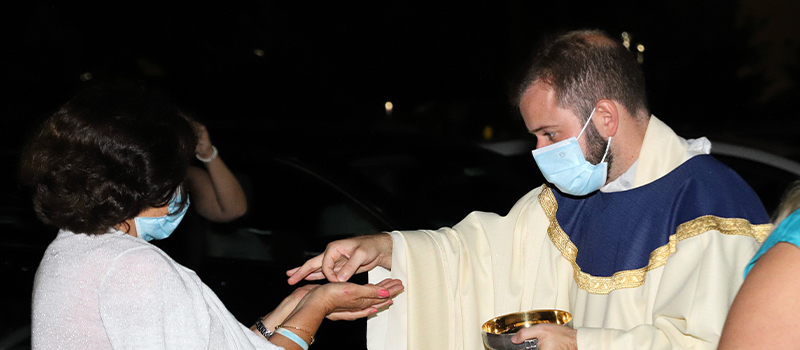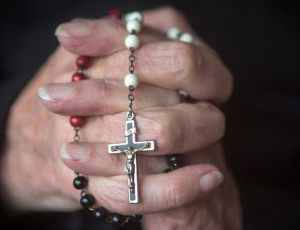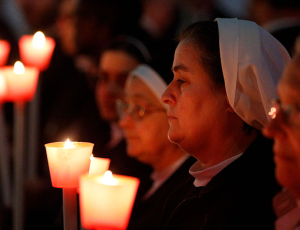A pastoral message from Bishop David M. O’Connell, C.M.
When the dispensation from the obligation to attend Mass on Sundays and holy days of obligation issued by bishops for their dioceses during the COVID pandemic is finally lifted – and it will be – Catholics will be required again to “return to church.” Canon law defines “dispensation” as a “relaxation of a merely ecclesiastical law in a particular case” that “can be granted by those who possess executive power (canon 85).” The Mass obligation referred to above is an “ecclesiastical law” presented in the 1983 Code of Canon Law: “On Sundays and other holy days of obligation, the faithful are obliged to participate in Mass (canon 1247).” Its history is much older than that.
Deriving from the Third of the “Ten Commandments” mentioned in the Old Testament Books of Exodus and Deuteronomy as given by God to Moses – “keep holy the Lord’s Day” – the “obligation” to attend and participate in Sunday Mass was evident in the Church’s experience and history as early as the time of the emperor, Constantine (272-337 AD). Early Church Council documents from the fourth century on also contain references to this obligation and by the sixth century, required attendance at Mass on Sundays and certain other holy days was universally normative.
The Mass obligation is present in the “Precepts of the Church,” as we have come to know them, gradually developed throughout the Church in the Middle Ages: “You shall attend Mass on Sundays and on holy days of obligation and rest from servile labor.” The first Code of Canon Law promulgated in 1917, the “Constitution on the Sacred Liturgy” of the Second Vatican Council (1962-65), and, as mentioned earlier, the 1983 Code of Canon Law all affirm the nature of attendance and participation at Mass on Sundays and certain holy days as obligatory.
The Catechism of the Catholic Church promulgated by Pope St. John Paul II in 1992 states:
The precept of the Church specifies the law of the Lord more precisely: “On Sundays and other holy days of obligation the faithful are bound to participate in the Mass.” “The precept of participating in the Mass is satisfied by assistance at a Mass which is celebrated anywhere in a Catholic rite either on the holy day or on the evening of the preceding day (CCC 2180).”
The Sunday Eucharist is the foundation and confirmation of all Christian practice. For this reason, the faithful are obliged to participate in the Eucharist on days of obligation, unless excused for a serious reason (for example, illness, the care of infants) or dispensed by their own pastor. Those who deliberately fail in this obligation commit a grave sin (CCC 2181).
Participation in the communal celebration of the Sunday Eucharist is a testimony of belonging and of being faithful to Christ and to his Church. The faithful give witness by this to their communion in faith and charity. Together they testify to God’s holiness and their hope of salvation. They strengthen one another under the guidance of the Holy Spirit (CCC 2182).
The Catechism helps us, as Catholics, recall that there is much more to attending Mass on Sundays and holy days of obligation than the fulfilling of a “merely ecclesiastical law.” Catholics gather together as a community of faith to offer spiritual support to one another, to hear God’s Word, to receive the Lord Jesus’ Body and Blood and to renew their sacramental commitment to live the Christian life. The Holy Eucharist is, as the Second Vatican Council reminded us, its “source and summit.”
Pope St. John Paul II also wrote about the Sunday Mass obligation in his 1998 apostolic letter Dies Domini, “On Keeping the Lord’s Day Holy:”
Even if in the earliest times it was not judged necessary to be prescriptive, the Church has not ceased to confirm this obligation of conscience, which rises from the inner need felt so strongly by the Christians of the first centuries. It was only later, faced with the half-heartedness or negligence of some, that the Church had to make explicit the duty to attend Sunday Mass: more often than not, this was done in the form of exhortation, but at times the Church had to resort to specific canonical precepts. This was the case in a number of local Councils from the fourth century onwards (as at the Council of Elvira of 300, which speaks not of an obligation but of penalties after three absences) and most especially from the sixth century onwards (as at the Council of Agde in 506). These decrees of local Councils led to a universal practice, the obligatory character of which was taken as something quite normal.
To “go to Mass” as the Church requires, therefore, is not a negligible or arbitrary matter, something that Catholics should take lightly. If intentional, missing Mass on Sundays and holy days of obligation is considered gravely sinful. But there are circumstances when missing Mass is not only understandable but the better course of action. The virulently contagious coronavirus that resulted in a world-wide pandemic infecting over 37 million people and killing over 1 million since the early part of 2020 is certainly such a circumstance. Personal illness or disability have always been considered valid excusing factors, but a deadly contagion on such a massive scale has made missing Mass advisable and necessary, especially for the elderly and those with other underlying health conditions.
Diocesan bishops are the spiritual leaders and pastors of the regions and people that the Church has entrusted to their care. With respect to their dispensation power, canon law states the “diocesan bishop, whenever he judges that it contributes to their spiritual good, is able to dispense the faithful from universal and particular disciplinary laws issued for his territory or his subjects by the supreme authority of the Church (canon 87.1).” As far as the subject matter of the current dispensation is concerned, canon law continues to state that there must be “a just and reasonable cause, after taking into account the circumstances of the case and the gravity of the law from which dispensation is given (canon 90.1).” Issuing a dispensation from the requirement of Church law to attend and participate in Mass on Sundays and holy days of obligation during the COVID pandemic certainly constitutes “a just and reasonable cause” for dispensation.
In a recent letter issued by Cardinal Robert Sarah, prefect of the Vatican Congregation for Divine Worship and Discipline of the Sacraments, the Cardinal wrote about dispensing the Mass obligation in times of pandemic,
In listening to and collaborating with civil authorities and experts, bishops and episcopal conferences were prompt to make difficult and painful decisions, even to the point of suspending the participation of the faithful in the celebration of the Eucharist for a long period. This Congregation is deeply grateful to the bishops for their commitment and effort in trying to respond in the best possible way to an unforeseen and complex situation.
The duration of the dispensation clearly falls within the authority of the diocesan bishop, as does the time for its end. To assist him in that determination, the diocesan bishop must depend upon the best advice of professional scientific and medical experts as well as civil authorities elected to protect and preserve the common good. His spiritual and pastoral decision should not be arbitrary or without a strong foundation, especially when public health is at risk. He should establish and communicate clear and reasonable spiritual and pastoral directives for the faithful (clergy, religious, laity) of his diocese.
What do the faithful do in the meantime until the dispensation regarding attendance and participate in Mass on Sundays and holy days of obligation is lifted? The commandment to “keep holy the Lord’s Day” is not merely “ecclesiastical law,” it is divine law. The faithful should honor that command as best they can during COVID restricted circumstances. If Mass is scheduled in parish churches under occupancy limits with wearing masks and observing social distancing required, or if Mass is offered outdoors, in parking lots, etc., the faithful may consider attending but only as long as age or underlying health conditions do not dictate otherwise. Follow all diocesan protocols and directives. Mass is also readily accessible online or on television. Spiritual communions can be made. Participate that way. Personal and family prayers are easily obtained and offer opportunities for spiritual strength and comfort as does reading the Scriptures.
It must be emphasized again, the elderly and people with underlying, compromising health conditions making them particularly susceptible to COVID infection should avoid crowds and stay home until the pandemic ends.
The COVID pandemic has introduced into our Catholic spiritual life the need for adapting our traditional, even required, spiritual practices to the current health crisis. Such adaptation will continue until the pandemic is under control. So will the dispensation from Mass obligations “until further notice.” It may even include Christmas this year and we should prepare ourselves for what may be inevitable.
But the dispensation discussed here will NOT be forever and our current practice will end. Once the dispensation is lifted – and it will be – Catholics will be expected and obliged to attend Mass on Sundays and holy days, as the Church has required since its earliest days. We should not become lax or in any way complacent, presuming that a return to Mass is no longer necessary for Catholics.
Again, Cardinal Sarah wrote in the abovementioned letter,
As soon as circumstances permit, however, it is necessary and urgent to return to the normality of Christian life, which has the church building as its home and the celebration of the liturgy, especially the Eucharist, as “the summit toward which the activity of the Church is directed, at the same time it is the font from which all her power flows (Sacrosanctum Concilium, 10).”
Aware that God never abandons the humanity he has created, and that even the hardest trials can bear fruits of grace, we have accepted our distance from the Lord’s altar as a time of Eucharistic fasting, useful for us to rediscover its vital importance, beauty and immeasurable preciousness. As soon as is possible, however, we must return to the Eucharist with a purified heart, with a renewed amazement, with an increased desire to meet the Lord, to be with him, to receive him and to bring him to our brothers and sisters with the witness of a life full of faith, love, and hope.
As faithful Catholics, then, let us wait and pray with patient anticipation for the time when Catholics can “return to the normality of Christian life.




